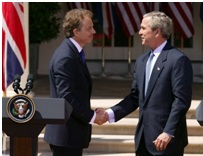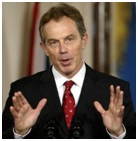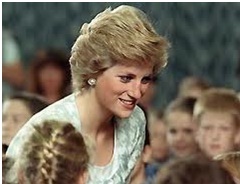|
 |
|
 |
|
|
||
Tony Blair Leadership
Tony Blair (1953-)
British prime minister, best known for New Labour (a low tax, pro-business version of the old Labour Party) and the invasion of Iraq. Blair (pictured right) married Cherie, a barrister and judge.
How can he be described as a leader?
1. Principled but dogmatic His belief in God gave him an unshakeable belief in his own moral rightness. “Do the right thing, according to your conscience”, he says. But sometimes he didn’t have the humility to take into account the views of his opponents and ordinary people (e.g. over the Iraq War) He was isolated from public opinion by an army of advisers (or spin doctors), led by his long time press secretary, Alastair Campbell (pictured right).
2. Ambitious His great ambition to be prime minister was spurred on by:
He believes that the two enemies of success are
3. Tough (but could have been tougher) He can be :
He also coped well with the pressures of his job, having little time for family, reflection and relaxation. His weakness (according to his biographer Anthony Seldon) was that he wasn’t tough enough to stand up to strong personalities like:
Brown claims that in 1994 Blair promised that he wouldn’t serve as prime minister for more than ten years . This meant that Brown was perpetually aggressive and Blair gave him too much power.
4. Too trusting He likes to think the best of everyone, even when they don’t deserve it. This may have led him to misjudge George W. Bush (pictured together right in 2003) and overlook his real reasons for invading Iraq (like revenge).
5. Great communicator and persuader He’s a great public speaker and TV performer. He talks with charm and compassion
(or the sliminess of a rattlesnake according to his critics). In the 1997 general election campaign, he brilliantly communicated his vision of a fairer, more enterprising Britain. His greatest diplomatic achievements were
He was the first British prime minister to talk directly with the Catholic terrorist group, the IRA.
6. Mistrusted Nicknamed ‘Bliar’, many people thought he lied over the cause of the Iraq war, Saddam Hussein’s (pictured right) weapons of mass destruction. The Butler inquiry in 2004 concluded the intelligence services told Blair there were such weapons but the evidence was very weak.
7. Autocratic Like his favourite politician, Margaret Thatcher (pictured right), he liked telling people what to do and how to do it (like reforming schools and the NHS, Britain’s state owned health service). He was not so good at:
He didn't like debate in Parliament, or consulting with his Cabinet.
8. Calm in a crisis His calm dignity and eloquence effectively dealt with many crises including
Key quotes on success and ethics My life’s purpose is about idealism. I don’t think that you should ever bend on basic fundamental beliefs and convictions.
Key quotes on leadership The art of leadership is saying no, not yes. It is very easy to say yes We are the servants of the people. What makes you a progressive? I would say: belief in social justice. I can only go one way. I’ve not got a reverse gear.
Key quote on education “Ask me my three main priorities for government, and I tell you: education, education, education”.
Key quote on Gordon Brown “Gordon [Brown] is the only friend I have ever lost”.
Key quotes on war and terrorism “I will answer to my Maker for the people who died” (about Iraq). “Our ultimate weapon is not our guns, but our beliefs” (on the fight against terrorism).
Key quote on Africa “The state of Africa is a scar on the conscience of the world” |
|
|
||
|
|
||
| Copyright © wisdomtowin.com 2025 All Rights Reserved | ||
|












